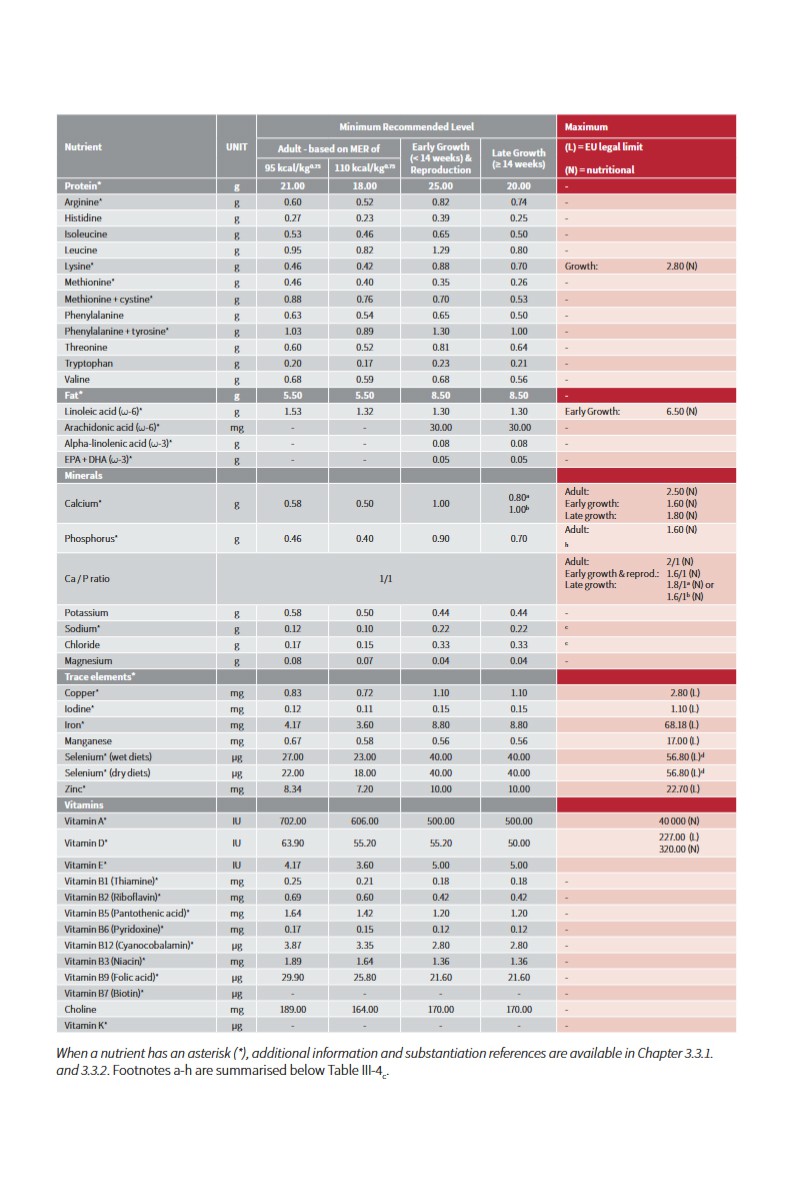What Vitamins and Minerals Do Dogs Need Daily?
Scientific research into what dogs need in their diet is still ongoing. How much of each vitamin or mineral your dog needs depends on factors like whether the dog is still growing and how active it is. Breed and stress levels can also affect your dog’s nutritional needs.
Feeding
.png)
3 August '25 • 3 min reading time
Some vitamins can be produced by the dog’s own body, while others must come from food. You can read more about that in another article.
Overview of Vitamins and Minerals
To offer a general guideline, here is an overview of the minimum recommended amounts in complete dog food. While these are not the absolute minimum requirements, they do offer a good indication of the current understanding of what a dog needs in its daily diet.
Minimaal aanbevolen hoeveelheden van diverse stoffen in compleet hondenvoer. Voor volwassen honden worden twee niveaus van activiteit beschreven.
Bron: FEDIAF, de Europese vereniging van diervoerproducenten.

Minerals, Vitamins, and Trace Elements
Looking at the table, dogs need to receive minerals such as calcium, phosphorus (in the correct ratio), potassium, sodium, chloride, and magnesium through their food. When it comes to vitamins, dog food should mainly contain B vitamins, as well as vitamins A, D, E, and K. The essential trace elements include copper, iodine, iron, manganese, selenium, and zinc.
Minerals
Calcium and phosphorus are essential for bone development, joints, and teeth. Because they can interfere with each other’s absorption, it's important to maintain the right balance—so don’t supplement one without considering the other.
Silicon is also very important for building strong joints and contributes to a healthy coat. Although there is no official guideline for silicon in dog food, it plays a crucial role in forming cartilage, connective tissue, and bones. Silicon supports the body’s own production of glucosamine exactly where it’s needed. Supplementing silicon is especially recommended for growing dogs or dogs with joint issues.
Sodium, potassium, and magnesium are also vital, particularly for the nervous system and in warm weather. Magnesium is also essential for muscle function. If your dog is active or often anxious and stressed, a magnesium deficiency can develop. Signs may include nervousness, muscle tremors, cramps, or jittery behavior. Magnesium can be easily supplemented, and any excess is excreted in urine.
Vitamins
Vitamin A is a fat-soluble vitamin crucial for eye health, immunity, and fertility in dogs. It plays a role in the body’s defense against free radicals and oxidants. A deficiency can lead to reduced vision, weakened immunity, and fertility issues.
Vitamin E is important for muscles and fertility. Most commercial dog foods contain enough vitamin E. However, some breeds (e.g. Cocker Spaniels) may have a genetic disorder that causes a deficiency.
Vitamin D is also essential—but caution is needed. Unlike some other vitamins, excess vitamin D can be harmful. It may lead to bone loss and high calcium levels in the blood, which in turn can cause kidney or heart failure. Dogs can also produce some of their own vitamin D. Never give vitamin D supplements without veterinary advice. If you’re giving your dog salmon oil (for skin and coat), make sure it’s a pet-specific version—human-grade oils often contain added vitamin D.
Vitamin K is another fat-soluble vitamin. It doesn’t have a listed minimum requirement in the chart, but deficiencies can still occur, especially if your dog suffers from a gastrointestinal disease that affects nutrient absorption. This can lead to spontaneous bleeding. In healthy dogs, vitamin K deficiencies are rare.
Trace Elements
More about trace elements will follow in a separate article.
Sources:
Fediaf guidelines
Shastak, Y.; Pelletier, W. Pet Wellness and Vitamin A: A Narrative Overview. Animals 2024, 14, 1000. https://www.mdpi.com/2076-2615/14/7/1000
Marceglia G, Petini M. Vitamin K deficiency as a cause of oral bleeding in a dog with intestinal malabsorption due to lymphocytic-plasmacytic enteritis. Open Veterinary Journal. 2025 May;15(5):2277-2282. DOI: 10.5455/ovj.2025.v15.i5.46. https://europepmc.org/article/MED/40557093


